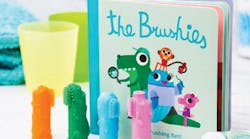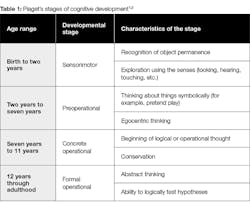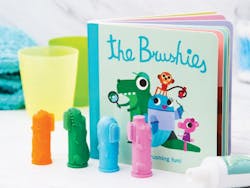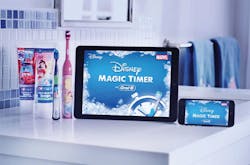Products that make kids smile
Alyssa Delgado, MSDH, RDH
Child development has been studied and researched since 1936 when Jean Piaget became the first psychologist to theorize the stages of cognitive development. Piaget “regarded cognitive development as a process which occurs due to biologic maturation and interaction with the environment.”1,2 His theory can give health-care providers insight into pediatric patients’ development based on age.
It is important for children to develop healthy habits starting at a very early age to promote future health and well-being. This can be accomplished through imitation of healthy habits and introduction to products and routines that promote a healthy lifestyle.3 Using Piaget’s stages of cognitive development (table 1), dental hygienists can recommend products and routines appropriate to pediatric patients’ development.1,2
The first stage of cognitive development is the sensorimotor stage, which typically occurs from birth to two years of age. During this stage of cognitive development, the child explores the world by looking, hearing, touching, and mouthing.2 Children under the age of two love to explore the world by putting things in their mouths, so introducing brushing at this developmental stage can increase the likelihood that they will maintain this healthy habit later on.
Children will repeat behaviors with positive associations.1 It is recommended to begin oral hygiene behaviors by stimulating the child’s gum tissue, even before tooth eruption occurs and as early as four weeks old. Parents or caregivers can introduce brushing in a positive manner by using finger brushes in fun colors and characters, such as the Brushies finger puppets (figure 1).i Each finger-puppet toothbrush comes with a storybook to engage the child and provide tips to parents or caregivers on introducing a brushing routine.
Between the ages of two and seven years, children will transition to the preoperational stage of cognitive development. During this stage, key lifestyle habits will begin to form. A habit is defined in Merriam-Webster as an acquired behavior pattern regularly followed until it has become almost involuntary. 3
Figure 1: The Brushies finger puppets
Building on the positive association with oral hygiene behaviors that began in the sensorimotor stage, children will need to continue repetition of the behavior to solidify it as a healthy habit.1,2 The most common way to establish healthy behaviors is with the reminder, routine, and reward method.4 This method can be applied toward oral hygiene behaviors by maintaining consistent routines and schedules, rewarding the positive behavior, and engaging the child in the process.
Oral-B’s Disney Magic Timer is a free application that can be downloaded on any smartphone or device (figure 2).ii Children can chose from the Disney, Marvel, or Star Wars characters that are found on Crest & Oral-B children’s toothbrushes. This application reminds children to brush and encourages brushing for the recommended two minutes, as children watch a hidden picture come to life on the app by “brushing” away the bubbles. The app tracks oral hygiene behaviors and healthy dental checkups, and children can earn badges and stickers as rewards for good oral hygiene practices.
As children move to the concrete operational stage, which is seen from age seven to age 11, they begin to grasp more complex concepts, and their thinking becomes more logical.2 In addition, children begin to develop fine-motor skills between the ages of five and 12 years of age, which can help them brush effectively.5 A US study found the average length of time people spend brushing is only 46 seconds.6 Children in this developmental stage have an especially hard time brushing for the recommended two minutes twice a day.7
Figure 2: Oral-B Disney Magic Timer
Brush DJ is a free application that children or adults can download on any smartphone or device. It aims to motivate users to brush for two minutes by playing music, taken randomly or from a playlist from the music stored on the user’s device and cloud.iii Listening to music while performing a task such as tooth brushing can increase the length of the activity and make the experience more pleasurable.7 This application also allows the user to set reminders on the phone or device to brush two times daily, floss, use mouth rinse, and see a dentist, hygienist, dental therapist, or orthodontist. Users of this application reported that the app motivated them to brush their teeth and to do so for longer, and they indicated that they no longer found the process boring and in fact looked forward to brushing as they found it to be more fun and enjoyed the music.7
Research has shown that the parent or caregiver’s beliefs and behavior have a profound influence on the child’s oral health behaviors.5 Studies have shown that parental frequency of tooth brushing and frequency of consumption of sweet foods between meals have a significant relationship with these behaviors in children.5 Instilling positive and healthy habits while children are still developing can influence their health as adults.5 Children typically reach the formal operational stage and develop complex and abstract reasoning skills around the age of 12.2 At this stage, it is important to encourage children to make healthy choices and continue their oral health behaviors consistently.4 Many oral changes occur during this stage, and children often have mixed dentition and orthodontic treatment during these formative years. Recommendations for electric toothbrushes, water flossers, or flossing picks should be made based on the child’s specific needs at that time.
Dental hygienists can play an important role in the development of oral health behaviors for children in all stages of growth. There are a wide variety of age-appropriate oral hygiene products on the market that are tailored to the needs of children in each developmental stage. It is important to involve children in the decision-making process and choose products that they enjoy and get excited to use to strengthen the positive association with the oral hygiene behavior. By promoting proper oral hygiene behaviors, encouraging positive and fun routines, and rewarding healthy habits, dental hygienists can influence the health and well-being of children that can continue through adulthood.
Notes
• The Brushies finger-puppet toothbrushes are available online and in stores for $9.95–$29.95. Learn more at thebrushies.com.
• Oral-B’s Disney Magic Timer App is available from Google Play or the Apple App Store for free. Learn more at oralb.com/en-us/products/compare/disney-magic-timer-app.
• Brush DJ is available from Google Play or the Apple App Store for free. Learn more at brushdj.com.
References
1. McLeod SA. Jean Piaget’s theory of cognitive development. Simply Psychology website. https://www.simplypsychology.org/piaget.html. Published June 6, 2018.
2. Wadsworth BJ. Piaget’s theory of cognitive and affective development: Foundations of constructivism. 5th ed. White Plains, NY: Longman Publishing; 1996.
3. Habit. Merriam-Webster website. https://www.merriam-webster.com/dictionary/habit. Accessed November 16, 2018.
4. Gardner B, Lally P, Wardle J. Making health habitual: the psychology of ‘habit-formation’ and general practice. Br J Gen Pract. 2012;62(605):664-666. doi:10.3399/bjgp12x659466.
5. Amin MS, Harrison RL. Understanding parents oral health behaviors for their young children. Qual Health Res. 2009;19(1):116-127. doi:10.1177/1049732308327243
6. Creeth J, Gallagher A, Sowinski J, et al. The effect of brushing time and dentifrice on dental plaque removal in vivo. J Dent Hyg. 2009;83(3):111-116.
7. Khatoon B. The use of a mobile app to motivate evidence-based oral hygiene behaviour. Br Dent J. 2015;219(4):166-167. doi:10.1038/sj.bdj.2015.659
Alyssa Delgado, MSDH, RDH, is a dental hygienist with clinical experience working in pediatric dentistry. She graduated from the University of New Mexico with a master’s of science in dental hygiene. She now teaches full time in the dental hygiene program at Minnesota State University, Mankato. For more information or questions, email her at [email protected].




